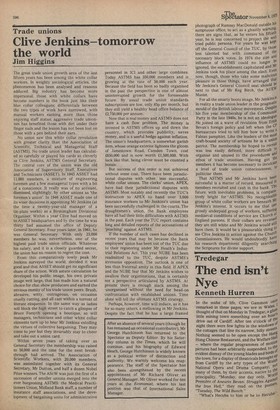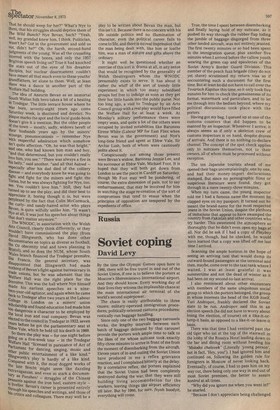Tredegar
The end isn't Nye
Kenneth Hurren
In the midst of life, Clive Gammon 001 remarked in these pages, we are in Wales. 4 thought of that on Monday in Tredegar, a OW] little mining town something over an hold' drive out of Cardiff. After ten o'clock of thef night there were few lights in the windovia ° the cottages that line its narrow, hilly streets' Nothing seemed to be open except the Hal Hong Chinese Restaurant, and the Welfare Ha — where the regular programmes of motion pictures had been arbitrarily suspended, to the, evident dismay of the young blades and birds el the town, for a display of theatricals broughtl from Cardiff by the arty types of the We t National Opera and Drama Company, many of them, by their accents, native to tnici' principality. "Monday, one day only, 1141014 Premiere of Anew-in Bevan: Struggles Agaill' the /ron Hell," they read on the posters, "Tuesday, The Wild Bunch."
"What's Hecuba to him or he to Hecuba/". That he should weep for her?" What's Nye to them, that his struggles should deprive them of The Wild Bunch? Nye Bevan, bach? "Yeah, Well, my grandad knew him, I think. Politician, wasn't he? Got in the government and sold us out, didn't he?" Oh, the harsh, second-hand judgments of the young. Was all the crusading interred with the bones, and only the 1957 Brighton speech living on? True it had knocked the stars out of the eyes of his dreamier disciples, but nuclear disarmament couldn't have meant all that much even to these youths' grandfathers, let alone to them. Well, at least there was a dance in another part of the Welfare Hall building. The idea of Aneurin Bevan as an immortal South Walian folk hero takes a bit of a beating in Tredegar. The little terrace house where he was born, seventy-eight years ago come Saturday week, is shuttered and derelict. No Plaque marks the spot and the local guide-book doesn't give it a mention. But the older people of the town — mostly, sadly, widows bereft of their husbands years ago by the miners'
.scourge, pneumoconiosis — remember Nye With respectful admiration which somehow isn't quite affection. "Oh, he was that bright," said one, who had known him man and boy, "and that determined, but you couldn't really love him, you see." "There was always a fire in his belly," said another, "and all that hatred — especially after his dad died of the colliery disease — and everybody knew he was going to fight and fight for the miners and fight the Tories, but he was always fighting for Nye, too, see. You couldn't love him," Still, they had turned up to see the play, and did their best to appreciate it, boring though it is, but were Perplexed by the fact that Colin McCormack, the curlyand sandy-haired actor who plays Nye3evari, is quite wilfully unlike him. "It wasn't y at all, it was just his speeches about things that don't matter anymore."
The WNODC, in association with the Welsh Arts Council, clearly think differently, or they wouldn't have commissioned the play (from Bavid Illingworth, who has done other
documentaries on topics as diverse as football,
the Oz obscenity trial and town planning in Bristol), and so does the NUM, whose South Wales branch financed the Tredegar premiere.
Dai Francis, the general secretary, was disappointed that Illingworth had made nothing of Bevan's fight against bureaucracy in trade unions, but he was adamant that the Welfare Hall was the right place for the Premiere. This was the hall where Nye himself rriade his earliest speeches as a nineteeri-year-old agitator, and again when he came back to Tredegar after two years at the Labour College in London on a miners' union scholarship and found education had made him tOo dangerous a character to be employed by the local iron and coal company. Bevan was elected to the council in Tredegar in 1922, seven Years before he got the parliamentary seat at Ebbw Vale, which he held till his death in 1960.
So there the play was — for one night before going on a five-week tour — in the Tredegar
Parliament Hall "licensed in pursuance of Act of Parliament for dancing, singing, music and Other public entertainment of a like kind." 1_11ingworth's play is hardly of a like kind. Compared with it, the most dogged works of the late Brecht might seem like dazzling extravaganzas, and even so stark. a documentary as Fanshen! — struggles of the Chinese Peasantsagainst the iron heel, eastern-style — i livelier. Bevan's career is presented entirely through his speeches and writings, and those of his critics and colleagues. There may well be a
play to be written about Bevan the man, but this isn't it. Because there is no concern with his life outside politics and no illumination of character, even the political career fails to come to life, and there is no real impression that the man being dealt with, like him or loathe him, was a man of stature and gifts above the ordinary.
It might well be questioned whether an exercise of this sort is drama at all, in any sense that would be recognised by the generality of Welsh theatregoers whom the WNODC presumably exists to serve. It has about it rather the whiff of the • sort of trendy little experiment in which too many subsidised groups feel free to indulge as soon as they get their hot little hands into the public purse. Not too long ago, a visit' to Tredegar by an Arts Council group with a real play would have filled the Welfare Hall for at least a week. At Monday's solitary performance there were empty seats, and quite a lot of the others were occupied by invited notabilities like Baroness Eirene White (Labour MP for East Flint when Bevan was in the government) and Nye's long-time friend and agent at Ebbw Vale, Sir Archie Lush, both of whom were cautiously polite about it.
Conspicuously not among those present were Bevan's widow, Baroness Jennie Lee, and his successor at Ebbw Vale, Michael Foot. It is hoped that they will both get down from London to see the piece in Cardiff on Saturday, though Mr Foot may well be pondering, of course, the extra dimension of pain, not to say embarrassment, that may be involved for him in watching the stage re-creation of the sort of compromises that tend to ensue when the principles of opposition are tempered by the expedients of office.

































 Previous page
Previous page